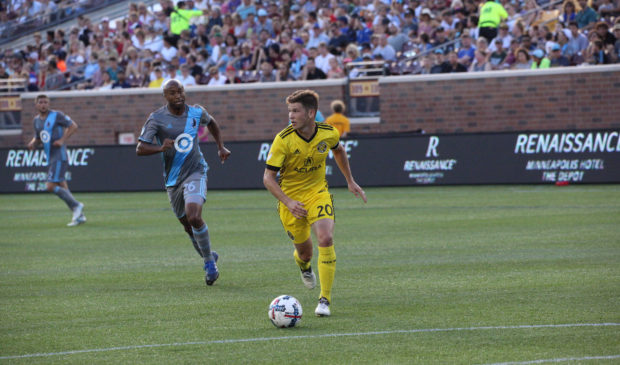Amid ‘tight timeline,’ soccer stadium debate gets very public
Monday, June 4, 2018 by
Chad Swiatecki With Friday’s release of two key documents related to Austin’s possible home for a relocated Major League Soccer team – and the push to build a stadium for the team on city-owned property – it’s likely that every City Council session in the near future will have some time dedicated to the issue.
That’s because Precourt Sports Ventures, the business group that owns the Columbus Crew SC team, has set the end of June as a deadline to have the major pieces of an agreement with the city in place so its representatives can begin the negotiations needed to establish a temporary home beginning in 2019.
“You’ve got two work sessions and two Council meetings in that time, and those are four opportunities for proposals and partnerships to be discussed in a public forum,” said Mark Littlefield, a member of PSV’s lobbying team in Austin. “Even if we are on a tight timeline, Austin is committed to having an open process in what it does, and we know both sides have to abide by that process.”
On Friday the city released its findings related to the push to use the 24 acres at McKalla Place as the location for the 20,000-seat stadium. That document found the site would be “suitable” for the stadium and also outlined the myriad infrastructure improvements needed there along with some consideration of how the city and PSV might split those costs.
In the time since the issue came up in the fall, city leaders have said they don’t intend for any tax dollars to be used to pay for the stadium, though the question of public works costs related to the project appears to be a more open question.
Also on Friday, PSV released its most comprehensive proposal to date for constructing and managing the stadium, which it intends to pay for entirely with private dollars. It outlines a plan for the city to retain the land and receive the stadium through a donation from PSV, who would lease the stadium from the city and also be responsible for its maintenance and overhead costs for up to 80 years.
The Precourt proposal also forecasts investment of $354 million over 25 years for local jobs, and commits to donating $4.8 million to affordable housing projects in the area, in partnership with Foundation Communities.
Affordable housing is expected to be a component of at least one of two mixed-use development proposals that will be presented on Tuesday to the monthly meeting of the Gracywoods Neighborhood Association, which is in the area around McKalla Place.
Monica Guzmán, chair of the Restore Rundberg Revitalization Team, said she and other community members in nearby neighborhoods in Council District 4 are in support of developments that would add affordable housing to the area that has been identified as one of the most gentrified in the city. “As far as what Precourt is presenting, I feel it’s a bad deal for the community, especially for those who live in the area,” she said.
“The city should be listening to the community and establishing a transparent, competitive process for this property. There’s developers interested in that property, and not for soccer. If it goes to a stadium, then Precourt Sports should be paying, at minimum, market rate for that property. I want to see low-income housing because we have an existing affordable housing crisis in Austin.”
Littlefield said he and other representatives from the soccer group plan to be in attendance at the Tuesday meeting to evaluate the proposals seeking to use the same property. The proposals will be presented by a team from Capella Capital Partners and an undisclosed development group that will be represented by the Husch Blackwell law firm.
“I haven’t seen either of those or heard much, though I have heard some rumors. So I don’t know what they’ll offer or say,” he said. “I look forward to seeing what they have, but I don’t expect it to affect our negotiations in any way over the next month.”
Photo by Andy Witchger made available through a Creative Commons license.
The Austin Monitor’s work is made possible by donations from the community. Though our reporting covers donors from time to time, we are careful to keep business and editorial efforts separate while maintaining transparency. A complete list of donors is available here, and our code of ethics is explained here.
You're a community leader
And we’re honored you look to us for serious, in-depth news. You know a strong community needs local and dedicated watchdog reporting. We’re here for you and that won’t change. Now will you take the powerful next step and support our nonprofit news organization?










